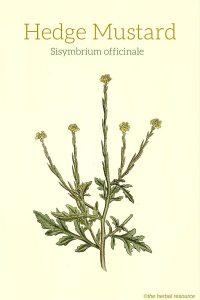Pedanius Dioscorides (1st century AD) called this plant erysimon and recommended that is should be used together with honey as an antidote in case of poisoning. He also stated that it could be used as a treatment for a variety of diseases and ailments.
One of the better known traditional use of the herb was to treat hoarseness or a complete loss of voice, and for this reason, the plant was sometimes called the singers’ plant.
Pliny the Elder (23-79 AD), a Roman author, naturalist, and philosopher claimed that the herb was extremely good against a cough and as an excellent remedy for throat inflammation.
Hedge mustard was also used as folk medicine for ailments such as the common cold, gallbladder ailments, jaundice, pleurisy, sciatica and ulcers. The fresh mashed herb was used externally as a remedy for gout and rheumatic ailments.
Because the herb is rich in vitamin C it was used to keep scurvy at bay, and also as a diuretic agent. Almost all of these uses go back to Pliny and his writings.
Expectorant Properties
The essential oil extracted from hedge mustard contains sulfur compounds which can create a reflex reaction when they come into contact with the mucous membranes of the mouth and pharynx.
This, in turn, increases blood flow to the larynx and bronchi and allows for easier expelling of irritating mucus material.
The herb may, therefore, have a dampening effect on cough, throat irritation and inflammation.
In addition, the herb has an expectorant properties and can be used as a remedy for inflammation of the pharynx (pharyngitis), hoarseness, or voice impairment (aphonia) caused by inflammation of the vocal cords (laryngitis) and bronchitis.
Active Cardiac Glycosides
Hedge mustard contains (particular the seeds) cardiac glycosides, similar to those found in foxglove (Digitalis purpurea).
These glycosides are organic compounds that act on the contractile force of the cardiac muscle and are mostly used in the treatment of cardiac failure.
Although the glycosides found in hedge mustard are weaker than those found in foxglove the herb should not be consumed by people who have heart problems of any kind without consulting a qualified healthcare professional.
An Edible Plant
The fresh leaves can be eaten raw or cooked and used in salads, soups, sauces, and omelets.
Hedge mustard contains glucosinolates that break down and form a mustard oil similar to those found in “real” mustard plants like black mustard (Brassica nigra), brown mustard (Brassica juncea) and white mustard (Sinapis alba).
[Read more about Hedge Mustard…]

Leave a Reply